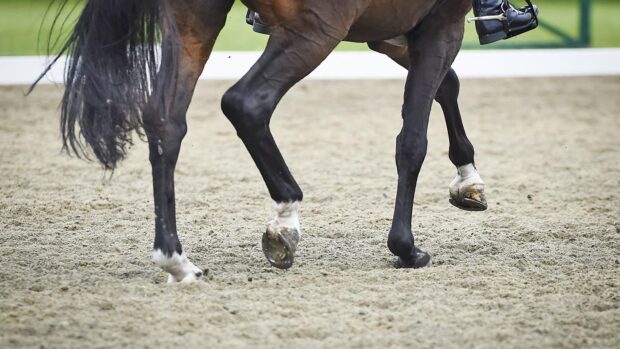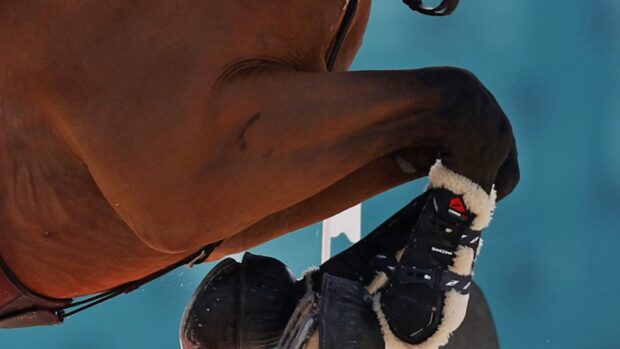An endurance rider who competed a horse with a “cocktail” of drugs in his system, blamed the positive test results on an operation he claimed he was unaware the horse had undergone days earlier.
Moro Tianko, trained and ridden by Saudi Arabian Mohammed Alalewi, tested positive for prohibited substances following the CEI2* 120km Al Ula on 2 February 2019. The gelding’s blood sample tested positive for banned substance tolfenamic acid (an anti-inflammatory drug with analgesic effects) and controlled substances lidocaine (a local anaesthetic used in the treatment of some skin diseases), flunixin, diclofenac, phenylbutazone and oxyphenbutazone (anti-inflammatory drugs with analgesic effects).
The FEI notified Mr Alalewi on 4 March 2019 of the findings and he was provisionally suspended until further notice pending a preliminary hearing at the FEI Tribunal. Moro Tianko was also provisionally suspended for two months. The rider was informed of his right to request an analysis of a B sample, which he did not do – and he did not challenge the results of the A sample.
On 6 March Mr Alawlewi submitted a “short” statement to the FEI alleging “he did not know the horse had an operation days a few days before the race”, and that the horse “took some treatments and medications that appear in the analysis”. He apologised and said he had regret for the “unintentional mistakes” and said these would not be repeated.
Under FEI rules, if there has been a violation involving both a banned substance and a controlled medication in a sample from the same horse at the same event, the person responsible shall be considered to have committed one doping rule violation and the sanction will be imposed based on the banned substance. Therefore the FEI charged Mr Alaweli based on the presence of the tolfenamic acid.
In a submission to the Tribunal the FEI stated Mr Alalewi did not corroborate his statement with any reliable evidence such as the horse’s medical records, log book indicating the date of operation or information on where the operation took place, or the exact names of the medications administered to the gelding and their purpose.
The FEI stated that to accept a “simple statement” as proof would undermine the whole anti-doping system and efforts to eradicate doping in the sport, adding that banned substances are never found in competition horses because they are substances with no legitimate use and have a “high potential for abuse”.
The FEI submitted Mr Alalewi had failed to establish on a balance of probability the “threshold requirement” of how the prohibited substances entered the horse’s body.
It was also stated by the FEI that as Mr Alalewi was the trainer and the rider of the horse, it was difficult to believe he would not have been aware of an alleged operation as any operation would have a “crucial impact” on the horse’s training and competition schedule. The FEI added, assuming this “highly improbable scenario” took place, Mr Alalewi’s lack of knowledge of a “supposed operation” amounted to a “flagrant breach” of his duty of care as a trainer.
Under FEI anti-doping rules, cases that present aggravating circumstances can carry an increased period of ineligibility of up to a maximum of four years – unless the person responsible can prove to the satisfaction of the Tribunal that they did not knowingly commit a violation.
The FEI submitted that a number of aggravating circumstances were present in this case, namely the analysis of the blood sample finding five different prohibited substances and Mr Alalewi not establishing the source.
Other aggravating circumstances submitted by the FEI were that the horse tested positive for several anti-inflammatory drugs which in combination “could be damaging to the horse’s organs such as the liver or kidneys”, and if there was an operation, sedation would normally be used (which carry around 48 to 72 hours detection time) – and no sedatives were found in the sample.
It was submitted by the FEI that without any “specific evidence to the contrary” for the presence of the prohibited substances, this suggested “intentional administration”. It was explained by the FEI that in endurance, trainers are key decision-makers for the horse and it was therefore “impossible to claim that a cocktail” of prohibited substances would have been administered without the trainer’s knowledge.
Article continued below…

FEI contamination warning: another horse’s positive dope test caused by groom’s urination
The groom confirmed on the day of the event he had urinated “close to the horse” and inside the trailer

Rider blames horse licking show staff member’s hands for positive dope test
The rider said staff at the event were not properly instructed or supervised

Subscribe to Horse & Hound magazine today – and enjoy unlimited website access all year round
The FEI recommended that owing to these factors, an increased ban of three years be imposed – adding that Mr Alalewi’s provision suspension period already served to be credited against this. A fine of 10,000 CHF (£8,426) and 2,000 CHF (£1,692) costs was also recommended.
On 4 November the Tribunal found Mr Alalewi’s theory that the prohibited substances were the result of an operation is “mere speculation”, adding that his lack of knowledge of the operation is “suspect”. As a result, the Tribunal decided the trainer had not established on a balance of probability how the tolfenamic acid entered the horse’s system.
The Tribunal considered the aggravating circumstances and given the “totality” of these, the Tribunal agreed with the FEI’s recommendation of a three-year ineligibility period and the recommended fine and payment of costs. The parties may appeal the decision to the Court of Arbitration of Sport within 21 days.
Horse & Hound magazine, out every Thursday, is packed with all the latest news and reports, as well as interviews, specials, nostalgia, vet and training advice. Find how you can enjoy the magazine delivered to your door every week, plus options to upgrade to access our H&H Plus online service which brings you breaking news as it happens as well as other benefits.



